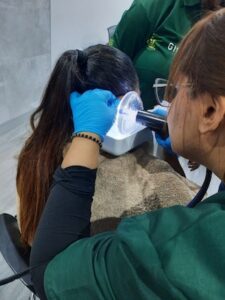‘Blindness cuts us off from things but deafness cuts us off from people’ [Helen Keller]
Hearing loss is more common than we think, up to 19% of South African school children suffer from varying degrees of hearing difficulties. Hearing is the foundation for speech and language development as well as learning and communication. The long-term impact of losing one of the key senses has a major impact on the quality of life.
Early detection and treatment is vital and it’s important to conduct hearing tests throughout a child’s schooling. However, the reality is that many learners have limited or no access to audiological screening and treatment. To address this important health issue and close the gap on hearing impediments, Bonitas Medical Fund has partnered with humanitarian aid organisation, Gift of the Givers, on a project that will initially screen around 15 860 learners during 2023.
‘The Gift of the Givers Foundation is internationally recognised for its swift disaster response, community support and healthcare interventions,’ says Lee Callakoppen, Principal Officer at Bonitas. ‘We are truly excited by this partnership and we know this ambitious project will have a profound impact on so many lives.’
The importance of hearing tests
According to the South African National Deaf Association (SANDA), children should have their hearing tested several times throughout their schooling: When they enter school, at ages 6, 8 and 10 and at least once during Grades 8 or 9 and Grades 10 and 12.
This audiology project, which is being rolled out over a 10-month period, will initially test around 15 860 learners across Grade R to Grade 12 at various schools located in six areas in KZN: Umlazi, Indanda, Chatsworth, Phoenix, Marionhill and Durban central. The plan is to expand the project to other Provinces.
Screening practicalities

A South African manufactured portable audiometer, called the Kuduwave, will be used for the project. This state-of-the-art, medically certified device has revolutionised the testing and diagnosis of auditory related deficiencies. It combines a headset, audiometer and sound booth into a single, lightweight device, which can be used in just about any location. This means the audiology team can test learners at school. ‘Two Kuduwave units will be used to increase capacity and reduce downtime,’ explains the audiology team at Gift of the Givers.
The programme is being overseen by an ear, nose and throat surgeon as well as an audiologist and speech therapist. They will provide training, consultation and oversight for the audiology team conducting the screenings.
‘Each test takes between 5 and 15 minutes,’ explains Gift of the Givers audiology team. ‘During which time the learner’s middle ear will be pressure tested for ear infections and ears will also be checked for inflammation and earwax.
Diagnostics and after-care
If the screening fails, a full diagnostic test will be undertaken. ‘This project not only covers the screening but goes a step further and offers an after-care element. This includes follow-up medical treatment, if required, to ensure learners receive the assistance they need so that their development is not delayed,’ explains the audiology team.
‘I cannot even begin to imagine a life without sound,’ says Callakoppen. ‘Not hearing someone’s voice, the lyrics of a song, rain falling on a roof or laughter. As a medical aid we advocate for prevention through early screening, detection and treatment for any ailment – including hearing.’
- Neonatal jaundice, what is it and what happens if my baby is born with it? - July 7, 2025
- Smoking and pregnancy – should I quit - July 1, 2025
- Your pregnancy – a comprehensive guide - June 23, 2025




